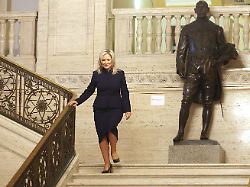After two years of blockade
Northern Ireland gets Sinn Fein head of government
February 4, 2024, 3:56 a.m
Listen to article
This audio version was artificially generated. More info | Send feedback
Disputes over customs controls after Brexit have caused a standstill in Northern Ireland for two years. Because the pro-British DUP party gives in, the way is clear for the first head of government from the Catholic Sinn Fein. Michelle O’Neill promises a new beginning, US President Biden congratulates.
After two years of political deadlock in Northern Ireland, Parliament met again and elected Sinn Fein politician Michelle O’Neill as head of government. After her appointment, she announced a new beginning for the British province in parliament in Belfast. The pro-British DUP party had previously given up its blockade of parliament. With Emma Little-Pengelly she is the deputy head of government. According to the 1998 peace agreement, the regional government in Belfast must be led jointly by Catholic nationalists and Protestant unionists. The Good Friday Agreement ended three decades of violence between Unionists, who are primarily Protestant, and the primarily Catholic Republicans.
For the first time since the Northern Irish Parliament was restored as a result of the agreement, an Irish nationalist politician has held the office of head of government. “This is a historic day and a new beginning,” O’Neill said after her appointment. “For my parents’ and grandparents’ generation,” this would have been “unimaginable.” She is “determined to continue the work of reconciliation,” O’Neill continued. “The past cannot be changed or undone, but what we can do, what we can all do, is build a better future.”
The 47-year-old had been the designated regional leader since May 2022 – at that time, Sinn Fein had become the strongest force in the parliamentary elections. But she was unable to take office because of the DUP’s blockade. Northern Ireland has remained without a functioning government since February 2022 because the DUP refused to participate in the executive and blocked parliament in protest against the Northern Ireland protocol in the Brexit agreement. Under the Northern Ireland Protocol, Northern Ireland de facto remains part of the European internal market despite Britain’s exit from the EU. This means that the region has to adhere to some EU regulations that do not apply anywhere else in the UK.
DUP approves post-Brexit rules
In the DUP’s view, this situation threatened to cut Northern Ireland off from Great Britain and make unification with Ireland more likely. A year ago, London and the EU agreed on changes to the protocol. The so-called Windsor Framework Agreement provides for significant simplifications in the goods controls required by Brussels. However, the compromise did not go far enough for the DUP. But a few days ago the DUP announced that it had approved an agreement with the British government on the application of post-Brexit rules. This cleared the way for the parliamentary session and thus for the formation of a government.
The agreement now reached with London provides for easier routine controls for goods that come from Great Britain across the Irish Sea and are intended to remain in Northern Ireland. The British government will also release a £3.3 billion aid package for Northern Ireland following public sector strikes. “Today is a good day for Northern Ireland” where “our place in the United Kingdom and its internal market is respected and protected,” said DUP leader Jeffrey Donaldson in Parliament.
US President Joe Biden also welcomed the formation of a government as an “important step” and praised the politicians involved for “taking the necessary steps to restore these important institutions.” This means that Northern Ireland can now “build on the immense progress of the past decades”. Biden, whose ancestors come from Ireland, visited Northern Ireland last April.
